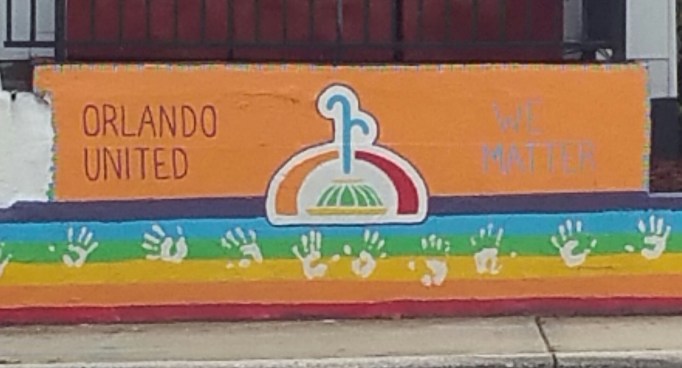One year ago, June 12, 2016, a man with evil, hateful intent entered Pulse nightclub in my Orlando hometown and shot into the crowd of innocent friends and family members enjoying a night of dancing. Of the many he struck down that night, 49 never rose again.
In the weeks and months following that cowardly assault, local manifestations of support showed humankind at its best: Donations poured into the OneOrlando Fund for the shooting victims and their families. Murals, T-shirts, and business markees displayed messages of encouragement and unity. Scholarships honored the memories of the fallen. Neighbors stood alongside strangers in solidarity while acknowledging differences.

Painting outside Orlando’s Zebra Coalition honors the 49 who died in the Pulse shooting (photo by Teresa TL Bruce, TealAshes.com).
Media coverage — initially 24-7 — ebbed over the year but has resurged as we’ve approached the first anniversary. Much has been tasteful and sensitive, though I observed one broadcaster recently say something that revealed a fundamental lack of understanding about grief: “As the anniversary approaches,” the person said, “it may even be possible some Pulse families and survivors will feel upset again.” (I’ve written that in quotes, but I paraphrased the actual words to avoid embarrassing the speaker.)
One fallacy of that statement is the implication that mourners might be upset again about their loved ones’ deaths — as if they’d had ample time to no longer be upset about it. But grieving, adjusting, and building new lives takes much, much longer than a mere 12 months. Even when, eventually, surviving loved ones manage to move forward in life without the deceased present in their lives, the absence will remain present and painful in survivors’ hearts.
The other fallacy in that well-meaning newscaster’s statement assumed that some Pulse families (and therefore not all) will find the first anniversary difficult. From the thousands of mourners I’ve interacted with, all expressed increased anxiety, sorrow, anger, irritability, and longing for their deceased loved ones in the days leading toward the first anniversary after death. All. Even among those whose deaths were peaceful and anticipated, the first anniversary brought with it more pain than resolution. Where death occurred via such senseless, hate-infused violence as was inflicted at Pulse, mourners’ minds and bodies especially rebel at reliving the date when their loved ones died.
With rare exceptions, grieving individuals and families find reaching the first anniversary of a loved one’s death offers an elusive, hoped-for, impossible, unfulfilled promise of relief from the bitter agony of bereavement. The hope is that if one makes it through that horrendous first year, one will be okay from then on.
The reality comes as an aftershock when the bereaved realize the beginning of the second year often brings renewed heartache and struggles in coping. Compounding the difficulty is the perception — and assertion — by friends and coworkers that mourners should be better by now or get on with their lives already. (If you hear such thoughts trying to work themselves into your words, erase them!)
For soul mates and partners, parents and siblings, cousins and other kin (by blood or law or choice), when it comes to the first year, grieving will never be one and done. Neither should the support and encouragement we offer, which should remain ongoing for as long as the loved ones are missed.
In other words, it’s never too late to let survivors know you are aware of their loss, and it’s never too late to show you care.


Thanks for the reminder. Even though my father and I weren’t close and he passed away more than 14 years ago, I still find myself missing him and tearing up at the thought of his birthday coming up next month. He’d have been 75.
LikeLiked by 1 person
There’s no expiration date for grieving those we’ve loved — close or not.
LikeLike